Abstract
Objectives:
This study is an attempt to establish the knowledge of the medical students on the specialty of plastic surgery, in addition, to know their opinions about its relationship with their cultural factors.
Patients and Methods:
This is a cross-sectional study; participants invited randomly from the college of medicine at King Khaled University to fill a questionnaire consisted of 20 questions regarding the basic knowledge, attitude, perception, and understanding of plastic surgery and its subspecialties.
Results:
Medical student participated in our study; their perception towards plastic surgery specialty was positive as they believed that this is a specialty as any other medical specialties; Out of 201 (45.6%), 81 (18.4%) assured plastic surgery is a good specialty. The biggest concerns about joining to cosmetic surgery were a difficulty of accepting in this specialty (34.9%). There is a significant relationship between the plastic surgery and cultural factors (P < 0.05). On other hand, there is no significant relation between choosing plastic surgery specialist among medical students and community overview about plastic surgery specialty (P = 0.15).
Conclusion:
Despite the confession of the importance of plastic surgery between Saudi medical students, a large portion of them refuses plastic surgeons due to cultural factors. Increasing knowledge of plastic surgery subspecialties deserves attention.
Keywords: Awareness, medical students, perception, plastic surgery, Saudi Arabia
Introduction
Cosmetic surgery is increasingly popular around the world in the last two decades. We can define that plastic and reconstructive surgery is a specialty of general surgery, which is concerned with the treatment of prenatal or acquired deformities of the skin and subcutaneous tissues in various parts of the body in order to improve both function and appearance.[1,2]
The field of plastic surgery is a dynamic and evolving specialty, not restricted by anatomy or organ system; there are many facets to plastic surgery. Subspecialties of plastic surgery comprise of breast surgeries, cleft lip surgery, hand surgery, maxillofacial trauma, skin cancer, trauma reconstruction, burns, esthetic surgery, oncology reconstruction, ophthalmic eye surgery, etc.[3,4] Plastic surgery has been evolved to contribute in many complex areas, previously managed by other specialties.[5]
Plastic surgery as a medical specialty is poorly understood by many, including primary care physicians, nurses, medical students, and the public.[6] There is a misunderstanding surrounding the scope of plastic and reconstructive surgery among both the public and professionals.[7,8]
This misperception extends to medical students in both the United States and the United Kingdom. Medical students’ awareness of plastic and reconstructive surgery has multiple implications. Poor awareness has repercussions for both future surgical and nonsurgical trainees. The latter is likely more significant as they will form a significant section of a plastic surgeon referral base. In addition, an improved understanding would expedite the referral process, reducing the cost to both patients and the healthcare system. With the increasingly tense economic climate in healthcare, improving the efficiency of the system has never been more important.[8]
Many studies held in different countries worldwide discussed the perception and knowledge of plastic surgery among medical students.[6,9,10] However, our study is the first in Kingdom of Saudi Arabia. We undertook this study with an aim to ascertain current awareness among the medical students about the surgical procedures that a plastic surgeon performs. Various studies have been conducted in many countries to determine the perception/awareness about plastic surgery.[1,7,11]
Despite the tremendous advancements in the field of plastic surgery, there seems to be a limited knowledge among the public and among medical professionals regarding the spectrum of plastic surgery. We felt that understanding the attitude and perception of our medical colleagues will be more vital than assessing the knowledge of the public. We wanted to know whom should we educate first—the doctors or the public. This study is an attempt to establish the knowledge of the medical students on the specialty of plastic surgery, in addition, to know their opinions about its relationship with their cultural factors.
Patients and Methods
Study design
In a cross-sectional study, a sample of 441 medical students aged between 19 and 26 years from the College of Medicine at King Khalid University was evaluated by questionnaire after taking the consent. Selection of participants was based on the simple random sampling method.
Study population
We invited students to participate in a 20-question electronic survey to assess their attitude, knowledge, perception, and understanding of plastic surgery and its subspecialties. The information sought in the questionnaire also includes demographics of the participants. The personal information about the students will keep confidential. The study was performed between the period Jan 2018 and Mar 2018.
Statistical analysis
The data have been computerized using the Statistical Package for Social Sciences (SPSS) version 22.0. For all analyses in this study, descriptive statistics were presented as number and percentage for categorical data and mean and standard deviation for quantitative data. Qualitative data were described using numbers and percent distribution, and Chi-square test (χ2) was used as a test of significance to detect association variables, Fisher's exact test was used to compare two by two tables if more than half of the expected values were <5 or any single expected value was <2, comparing was using student t-test with a significant level of <0.05.
Administrative consideration
The researchers have fulfilled all the required official approvals.
Ethical considerations
Ethical approval was taken from the ethical committee of King Khalid University, before interviewing, the researchers explained the purpose to all respondents and oral consent was asked from all the participants. The private information of the students was used for the purposes of research only. This research was not received any specific grant from funding agencies in the public, commercial, or not-for-profit sectors. Confidentiality and privacy will be guaranteed for all participants.
Results
Demographics
All participants were male from the Faculty of Medicine at King Khalid University; 441 medical students completed the questionnaire. The mean age was 22 ± 1.5 years. Most of them were at level 6 represented 67 (15.2%), level 7 represented 62 (14.1%), level 10 represented 61 (13.8%), level 5 represented 47 (10.7%), level 8 represented 45 (10.2%), level 9 represented 43 (9.8%), level 4 represented 37 (8.4%), and lower percentage of participants found in level 3, level 12, and level 11 which represented 29 (6.6%), 27 (6.1%), and 23 (5.2%), respectively. In the other hand, when asking the participants about their Grade Point Average (GPA) about half of them preferred not to answer 224 (50.8%), GPA (2) found between 14 subjects (3.2%), GPA (3) 79 subjects (17.9%), GPA (4) represented the majority of the students 108 (24.5%) and GPA (5) 16 subjects (3.6%) shown in Table 1.
Table 1.
Demographics of participants among medical students in King Khalid University, Saudi Arabia
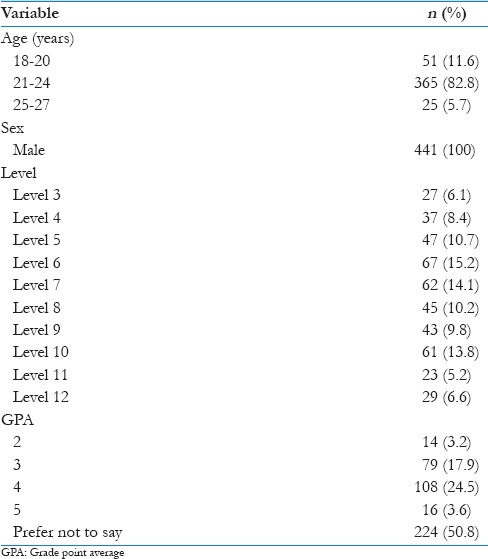
Knowledge of the medical students in the specialty of plastic surgery
Recommendations from family or friends were the most frequent answer 165 (37.4%) while asking about the main sources of information when selecting a plastic surgery. However, all of the above including doctors’ website, medical centers, and social media showed the least result 5 (1.1%). Table 2 illustrates the main sources of information when selecting a plastic surgeon, whereas Table 3 shows a number of students selecting each surgical specialty by clinical scenario.
Table 2.
The main sources of information when selecting a plastic surgery among medical students at King Khalid University, Saudi Arabia
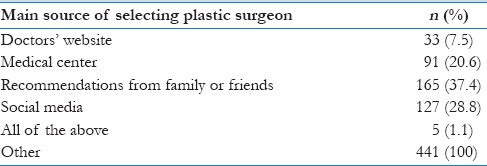
Table 3.
Number of students selecting each surgical specialty by clinical scenario surgery among medical students in King Khaled University, Saudi Arabia

Knowledge of participants estimated by asking them 12 questions about different medical scenarios and choosing the right specialty who related these cases; the correct supposed answer was plastic surgeon, so we consider it as the first-line treatment and any other answer (general surgeon, ENT surgeon, orthopedic surgeon, maxillofacial surgeon, ophthalmologist, and dermatologist) considered as a second-line treatment. Table 4 shows the correlation of the knowledge in choosing a first-line and second-line specialties in the different medical scenario; there is no significant difference in knowledge between the first and second line in hand and fingers’ fractures as most of the participants choose incorrectly the second line. Results show a significant difference regarding knowledge in selection of each specialty in different cases shown in Tables 5 and 6.
Table 4.
Correlation of knowledge of medical students selecting plastic surgery as a first-line specialty again other medical specialties as the second line with different medical cases in King Khaled University, Saudi Arabia
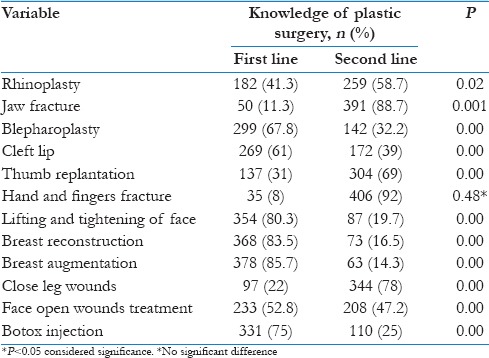
Table 5.
Association between knowledge of medical students and different variable in King Khalid University, Saudi Arabia
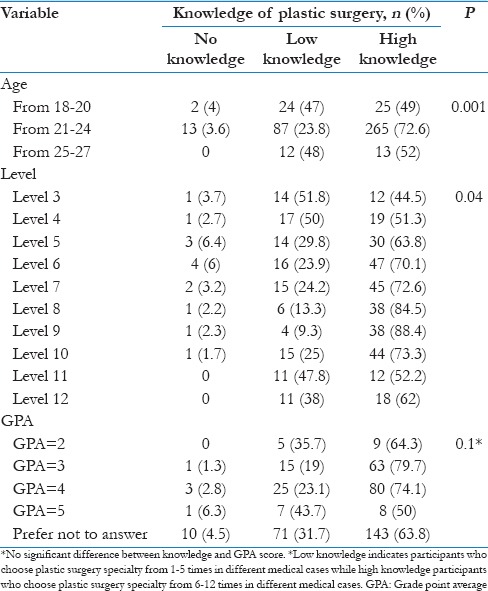
Table 6.
Correlation of opinion of medical students regarding plastic surgery specialty and different variables in King Khalid University, Saudi Arabia
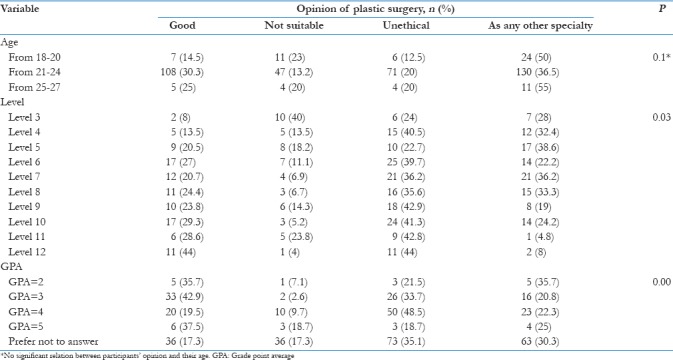
Figure 1 shows that the total knowledge of participants depending on the number of times they choose plastic surgery was not related to their knowledge of choosing plastic surgery as the correct answer in each scenario.
Figure 1.
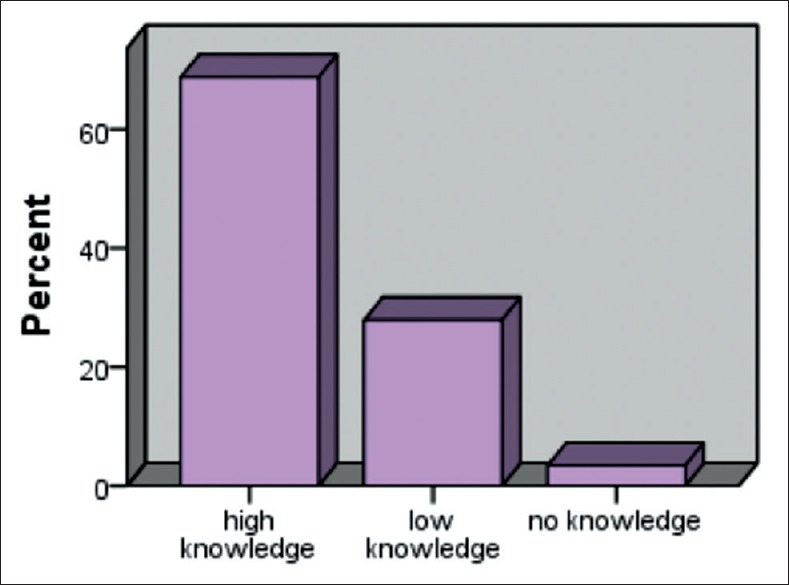
Total knowledge of participants about plastic surgery specialty
Perception and social factors
Majority of medical students was not interested in plastic surgery specialty. Out of 270 (61.2%), only 171 (38.8%) was interested in this field. Table 7 illustrated that 82.8% of participants perceived that plastic surgery is important. Table 8 shows the opinion of medical students about plastic surgery specialty through three questions.
Table 7.
Perception of medical students regarding plastic surgery specialty in King Khalid University, Saudi Arabia

Table 8.
General opinion of medical students regarding plastic surgery specialty in King Khalid University, Saudi Arabia
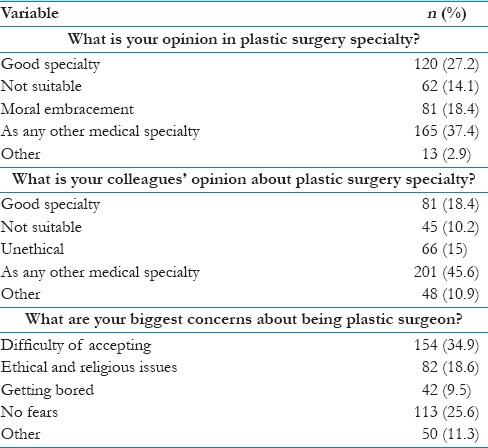
Figure 2 shows the answers of participants in percentage while asking the view of their colleagues in the faculty of medicine about the specialty of plastic surgery.
Figure 2.
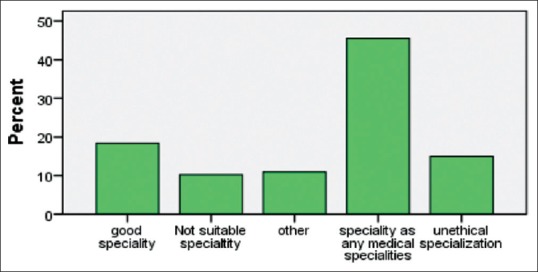
The view of colleagues in the Faculty of Medicine about the specialty of plastic surgery
The results indicate a significant relationship between knowledge and community overview. People with high knowledge show plastic surgery as normal as any other specialty. These appear in Table 9, which is highly significant (P = 0.0001).
Table 9.
Association between knowledge and community overview in King Khalid University, Saudi Arabia

Table 10 shows that there is a significant relationship between medical students’ opinion of the plastic surgery and cultural factors (P < 0.05). On the other hand, there is no significant relation between choosing plastic surgery specialist among medical students and community overview about plastic surgery specialty (P = 0.15).
Table 10.
The relation between community overview about specialty plastic surgery and medical students’ opinion in that field in King Khalid University, Saudi Arabia

Discussion
Plastic surgery is a unique specialty that defies definition, has no organ system of its own, and is based on principles rather than specific procedures. Unlike other medical disciplines, plastic surgery is not defined by an anatomic area (OB/GYN, ENT, thoracic surgery), organ system (gastroenterology, urology), or patient age group (pediatrics, adolescent medicine, geriatrics).[7] It deals with everything from head to toe but is associated with the prefix plastic, which symbolizes nothing to the common man and medical community at large.
According to American Society for Aesthetic Plastic Surgery, nearly 8.3 million cosmetic procedures were performed in 2003.[12] Although our knowledge and perception of plastic surgery in healthcare professionals are unheard of in our part of the globe.
In our study, medical students showed a gap in knowledge with respect to plastic surgery and relation with different subspecialties.[13] Participants showed plastic surgeon as the first-line specialist in the following surgeries: eyelid surgery, cleft lip surgery, lifting and tightening of the face surgery, breast reconstruction surgery, breast augmentation or reduction, face open wound treatment, and Botox injection. However, plastic surgery was less frequently chosen like thumb replantation, hand and finger fracture, jaw fracture, and close leg wound. These results are quietly matching with the results of Agarwal et al. Plastic surgery was chosen most frequently for rhinoplasty and breast reconstruction and less frequently for hand/peripheral nerve surgery and wound surgery.[14]
Recommendation from friends or a family was the primary source of information followed by social media. In other studies, television plays a role in shaping their idea about plastic surgery.[13,15]
The previous study resulted that TV shows and advertisement attracted 34.2% students. All these advertisements resulted in friends-gathering and surprisingly in 62.8% students; these discussions were the primary source of the information.[11]
Due to moral or religious issues, community overview in KSA refuses cosmetic surgery specialty, but the perception of medical students was differed and confess that plastic surgery is as normal as any kind of medical specialties and it is important.[11,16]
The limitation of our study may be the same geographical area, college, sex, and occupation. Maybe we need to enlarge sample size and ask people from the different areas including males and females to get more representable data.
Conclusion
Improvement in medical students’ education about the scope of plastic surgery and other subspecialties is needed, especially in the areas of thumb replantation, hand and finger fracture, jaw fracture, and close wound in the leg. Social factor has an important role in the perception of medical students as they have many reservations toward plastic surgery related to religious and ethical factors in the society; in general, we should take effective methods to improve the advocacy from them and spread the knowledge that plastic surgery is not only for cosmetics purpose but also for its criticality in many other medical conditions.
Financial support and sponsorship
Nil.
Conflicts of interest
There are no conflicts of interest.
References
- 1.Swami V, Taylor R, Carvalho C. Acceptance of cosmetic surgery and celebrity worship: Evidence of associations among female undergraduates. Pers Individ Dif. 2009;47:869–72. [Google Scholar]
- 2.Yun S, Na Y, Jin Y, Hur E, Heo W, Lee J, Lee S. A survey study on professional women's perception toward cosmetic surgery: 4 year comparison. Arch Aesthetic Plast Surg. 2015;21:70–4. [Google Scholar]
- 3.Reformat DD, David JA, Diaz-Siso JR, Plana NM, Wang A, Brownstone ND, et al. How many people work in your operating room? An assessment of factors associated with instrument recounts within plastic surgery. J Plast Reconstr Aesthet Surg. 2017;70:1285–91. doi: 10.1016/j.bjps.2017.06.028. [DOI] [PubMed] [Google Scholar]
- 4.Chao AH, Khansa I, Kaiser C, Bell J, Miller MJ. The differential impact of plastic surgery subspecialties on the financial performance of an academic clinical practice. Plast Reconstr Surg. 2014;133:748e–55e. doi: 10.1097/PRS.0000000000000174. [DOI] [PubMed] [Google Scholar]
- 5.Rogers AD, dos Passos G, Hudson DA. The scope of plastic surgery. S Afr J Surg. 2013;51:106–9. doi: 10.7196/sajs.1792. [DOI] [PubMed] [Google Scholar]
- 6.Fraser SJ, Al Youha S, Rasmussen PJ, Williams JG. Medical student perception of plastic surgery and the impact of mainstream media. Plast Surg (Oakv) 2017;25:48–53. doi: 10.1177/2292550317694844. [DOI] [PMC free article] [PubMed] [Google Scholar]
- 7.Panse N, Panse S, Kulkarni P, Dhongde R, Sahasrabudhe P. Awareness and perception of plastic surgery among healthcare professionals in Pune, India: Do they really know what we do? Plast Surg Int 2012. 2012 doi: 10.1155/2012/962169. 962169. [DOI] [PMC free article] [PubMed] [Google Scholar]
- 8.Conyard C, Schaefer N, Williams D, Beem H, McDougall J. The understanding of plastic and reconstructive surgery amongst Queensland medical students. JPRAS Open. 2016;8:14–8. [Google Scholar]
- 9.Farid M, Vaughan R, Thomas S. Plastic surgery inclusion in the undergraduate medical curriculum: Perception, challenges, and career choice – A comparative study. Plast Surg Int 2017. 2017 doi: 10.1155/2017/9458741. 9458741. [DOI] [PMC free article] [PubMed] [Google Scholar]
- 10.Agarwal JP, Mendenhall SD, Hopkins PN. Medical student perceptions of plastic surgeons as hand surgery specialists. Ann Plast Surg. 2014;72:89–93. doi: 10.1097/SAP.0b013e3182583f3b. [DOI] [PubMed] [Google Scholar]
- 11.Ahmad M, Mohmand H, Ahmad N. Views of college students on plastic surgery. World J Plast Surg. 2013;2:104–10. [PMC free article] [PubMed] [Google Scholar]
- 12.Sarwer DB, Cash TF, Magee L, Williams EF, Thompson JK, Roehrig M, et al. Female college students and cosmetic surgery: An investigation of experiences, attitudes, and body image. Plast Reconstr Surg. 2005;115:931–8. doi: 10.1097/01.prs.0000153204.37065.d3. [DOI] [PubMed] [Google Scholar]
- 13.Hashmi A, Khan FA, Herman F, Narasimhan N, Khan S, Kubiak C, et al. A survey of current state of training of plastic surgery residents. BMC Res Notes. 2017;10:234. doi: 10.1186/s13104-017-2561-5. [DOI] [PMC free article] [PubMed] [Google Scholar]
- 14.Agarwal JP, Mendenhall SD, Moran LA, Hopkins PN. Medical student perceptions of the scope of plastic and reconstructive surgery. Ann Plast Surg. 2013;70:343–9. doi: 10.1097/SAP.0b013e31823b6c19. [DOI] [PubMed] [Google Scholar]
- 15.Gould DJ, Leland HA, Ho AL, Patel KM. Emerging trends in social media and plastic surgery. Ann Transl Med. 2016;4:455. doi: 10.21037/atm.2016.12.17. [DOI] [PMC free article] [PubMed] [Google Scholar]
- 16.Pearl A, Weston J. Attitudes of adolescents about cosmetic surgery. Ann Plast Surg. 2003;50:628–30. doi: 10.1097/01.SAP.0000054365.54173.95. [DOI] [PubMed] [Google Scholar]


